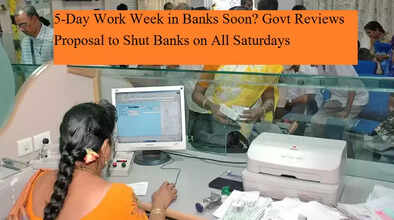5-Day Work Week in Banks Soon? Govt Reviews Proposal to Shut Banks on All Saturdays

5-Day Banking Week on the Horizon: Government Reviews Proposal to Close Banks on All Saturdays
In what could be a major shift for the Indian banking sector, the government is reviewing a proposal to implement a five-day work week in all public sector banks (PSBs). If approved, this change would mean that banks will remain closed on all Saturdays, offering greater work-life balance for employees while introducing a new rhythm for customers to manage their banking needs.
The Indian Banks’ Association (IBA) has submitted this proposal to the Ministry of Finance, suggesting that banks should operate only from Monday to Friday, with weekends entirely off. The idea is to streamline working days while enhancing employee welfare, especially in light of increasing stress levels and digitization in banking operations.
🔍 What’s the Current Rule?
At present, public sector banks in India are closed only on the 2nd and 4th Saturdays of every month. This policy has been in place since 2015, when the 10th Bipartite Settlement was signed between IBA and bank unions.
All other Saturdays (1st, 3rd, and 5th) are considered working days. This rule applies across all government-owned banks and continues to govern weekly banking schedules.
📝 What’s New in IBA’s Proposal?
The Indian Banks’ Association has urged the Finance Ministry to consider implementing a uniform 5-day work week for banks across the country. Under this proposal:
-
Banks will remain open only Monday to Friday.
-
All Saturdays and Sundays will be official non-working days.
-
It will bring public sector banks on par with other government departments and private firms that already follow a five-day schedule.
The proposal is part of an effort to modernize work culture in banks and align with global standards where weekend offs are the norm.
🏛️ What Has the Government Said?
Responding to a query in the Lok Sabha on 28 July 2025, the Finance Ministry confirmed that the proposal is currently under active review. However, there is no confirmed implementation date as of now.
While acknowledging the potential benefits, the ministry clarified that the review process is ongoing and any final decision will be based on multiple operational and economic factors.
📉 What About Staff Shortage?
Concerns regarding staff shortage were also raised during the Parliament session. MP K.C. Venugopal asked whether staffing issues could delay the implementation of the proposed change.
The government clarified that as of 31 March 2025, 96% of the sanctioned positions in public sector banks were filled. The minor shortfalls are due to retirements and routine resignations. It also noted that staffing decisions are independently made by each bank’s Board of Directors, depending on business needs, retirements, and workload assessments.
🧩 What It Means for Bank Employees
If the proposal is accepted:
-
Bank employees will enjoy a two-day weekend, potentially reducing burnout and improving productivity.
-
It could bring banking job perks closer to those enjoyed by employees in other government departments and MNCs.
-
The decision is also expected to improve employee morale and retention in the public banking sector.
👥 What About Customers?
While the move is largely seen as positive for employees, customers may need to adjust their banking schedules accordingly. A complete Saturday closure means all in-branch banking tasks would have to be completed Monday through Friday. However, with the rise of digital banking, most services remain accessible 24/7 via mobile apps and internet banking.
Banks may also consider extending weekday working hours to compensate for the reduced number of working days.
🔚 Conclusion
The proposal to introduce a five-day working week in banks marks a progressive step toward modernizing India’s banking sector. While it's still under government review, the move could soon become a reality, benefiting both employees and institutions.
Customers are advised to stay informed and prepare for any operational changes, especially if they rely on in-person banking. As digital services continue to evolve, the impact of such changes may be minimal for most users.

